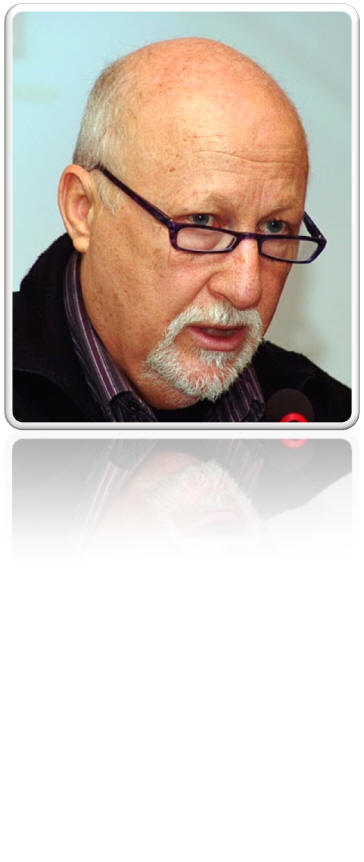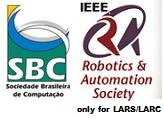

Laboratório de Robótica - Centro de Pesquisas da Petrobras - Brasil
Ney Robinson Salvi dos Reis has great experience in infra-structure projects from major Brazilian companies (such as COSIPA, Usiminas, Acesita, Nuclep). He is currently director of the robotics lab at PETROBRAS.
Imperial College London - UK
Yiannis Demiris heads the Bioinspired Assistive Robots and Teams (BioART) laboratory at the Department of Electrical and Electronic Engineering of Imperial College London, doing research on human-robot interaction, assistive robotics, and multirobot teams, with an emphasis on the mechanisms of development and learning. He received his PhD in Intelligent Robotics from the Department of Artificial Intelligence of the University of Edinburgh in 1999, and joined the faculty of Imperial College in 2001. He has organised several international conferences, including the IEEE conference on Development and Learning (ICDL-2007) as chair and the ACM/IEEE conference on Human Robot Interaction (HRI-2008) as program chair. He has edited three books on robot learning and guest edited special journal issues of the IEEE Transactions on Systems, Man and Cybernetics (Part-B) on Robot Learning by Demonstration and Imitation, and the journal of Adaptive Behaviour on developmental robotics. He has received fellowships from the European Science Foundation and AIST in Japan, and is a member of EPSRC college, and a senior member of the IEEE. He is participating in two European FP7 projects, ALIZ-E (Adaptive Strategies for Sustainable Long-Term interaction) and EFAA (Experimental Functional Android Assistant), while collaborating in industrial research projects with BAE Systems, and IBM.



Computer Science Department - Stanford University - USA
Yoav Shoham is Professor of Computer Science at Stanford University, where he has been since receiving his PhD in Computer Science from Yale University in 1987 and spending an abbreviated post-doctoral position at the Weizmann Institute of Science. He has worked in various areas of AI, including temporal reasoning, nonmonotonic logics and theories of commonsense. Shoham's interest in recent years has been multiagent systems, and in particular the interaction between computer science and game theory. Shoham is a Fellow of the Association for Advancement of Artificial Intelligence (AAAI), and charter member of the Game Theory Society. He is an author of four books, an editor of one, and an author of numerous articles. He is also a founder of several successful e-commerce software companies.
School of Computing - University of Leeds - UK
David Hogg has been a Full Professor at the University of Leeds since 1990, where he now heads the Computer Vision group. He was head of the School of Computing from 1996 to 1999, and a Pro-Vice-Chancellor of the University from 2000 to 2004. During 1999-2000 he was a visiting professor at the MIT Media Lab in Cambridge. He is a member of the EPSRC College, a Fellow of ECCAI, an Associate Editor of IEEE-PAMI, has been on the programme committee for most of the leading international conferences in the field for over ten years and advises many research funding agencies worldwide on a regular basis. His current research is on behaviour recognition, with emphasis on weakly supervised learning and integration with symbolic modes of reasoning. This work has applications in several areas, including security and HCI.

Invited Speakers
The Joint Conference 2010 will include some interesting presentations in Artificial intelligence, Artificial Neural Network, Robotics and related fields given by national and international recognized and acclaimed speakers.
Some Invited speakers confirmed:
Professor Witold Pedrycz, PhD
Depart.of Electrical and Comp. Eng.– University of Alberta -
Canada
Witold Pedrycz is a Professor and Canada Research Chair in Computational Intelligence in the Department of Electrical and Computer Engineering, University of Alberta, Edmonton, Canada. Dr. W. Pedrycz is an IEEE Fellow, IFSA Fellow and a Fellow of the Engineering Institute of Canada (EIC). Dr. Pedrycz received the M.Sc., Ph.D., and D.Sci. all from the Silesian University of Technology, Gliwice, Poland. His main research interests encompass fundamentals of Computational Intelligence, Granular Computing, Fuzzy Modeling and Control, Knowledge Discovery and Data Mining, Pattern Recognition, Knowledge-based Neural Networks, Relational Computing and Software Engineering. He has published vigorously in these areas. He is an author of over 250 journal papers published in highly reputable journals. His research is highly cited and he is also on the list of ISI highly cited researchers. Currently, Professor Pedrycz is Editor-in-Chief of Information Sciences and IEEE Transactions on Systems, Man, and Cybernetics (part A) and serves as an Associate Editor of IEEE Transactions on Fuzzy Systems.

Professor
Kate Smith-Miles,
PhD
School of Mathematical Sciences – Monash University - Australia
Kate Smith-Miles is a Professor and Head of the School of Mathematical Sciences at Monash University in Australia. Dr. Kate obtained a B.Sc (Hons) in Mathematics and a Ph.D. in Electrical Engineering, both from the University of Melbourne, Australia. She has published 2 books on Neural Networks and Data Mining applications, and over 175 refereed journal and international conference papers in the areas of Neural Networks, Combinatorial Optimization, Intelligent Systems and Data Mining. She is currently on the editorial board of several international journals including the prestigious IEEE Transactions on Neural Networks, and has been a member of the organizing committee for over 50 international data mining and neural network conferences, including several as chair. She was elected Fellow of the Institute of Engineers Australia (FIEAust) in 2006, and Fellow of the Australian Mathematical Society (FAustMS) in 2008. She has been a Senior Member of the IEEE since 2001. In addition to her academic activities, she also regularly acts as a consultant to industry in the areas of optimisation, data mining, and intelligent systems.


Computer Engineering Department - University of São Paulo - Brazil
Jaime Simão Sichman is an Associated Professor at University of São Paulo, from where he has obtained both his B.E. and M.E. degrees. He was one of the first students to obtain an European label to his PhD degree, developed at the Institut National Polytechnique de Grenoble (INPG), France, since part of his research was carried out at the Istituto di Psicologia del CNR, Rome, Italy. More recently, he has spent an abbreviated post-doctoral period at the University of Utrecht, at the Netherlands. His main research focus is multi-agent systems, more particularly social reasoning, organizational reasoning, multi-agent-based simulation, reputation and trust, and interoperability in agent systems. He has advised/co-advised 10 MsC and 8 PhD students and has published more than 160 papers in national and international conferences and journals. He is member of the editorial board of the Journal of Artificial Societies and Social Simulation (JASSS), Mediterranean Journal of Artificial Intelligence, Computación y Sistemas, and the Knowledge Engineering Review. He has organized several workshops and international conferences and workshops; in particular he was the SBIA/IBERAMIA General Chair (2000), Program Co-Chair (2006), and AAMAS Tutorial Chair (2007) and Program Co-Chair (2009).



Professor
Nigel Gilbert
Centre for Research in social Simulation,
University of Surrey, United kingdom
Modelling complex social systems:
opportunities and challenges
Social systems are almost invariably complex and thus amenable to some of the techniques developed by physicists and mathematicians for the analysis of complex systems. However, they are not the same as complex physical systems, and the differences are important. In this talk, I shall compare the two, identify the features that make social systems special, and consider the implications of the differences.This will lead me on to discuss some of the challenges that have to be faced in modelling social systems, especially using agent-based models, and to review the potential for this style of research.
Professor Helder Coelho
Dep. of Informatics,Faculty of
Sciences (FCUL) ,
University of
Lisbon,
Portugal
Helder Coelho is a full professor of the University of Lisbon (UL) in the Department of Informatics of the Faculty of Sciences, from August 1995. He is permanent and elected member of the National Academy of Engineering (1999) ECCAI fellow (2002). He published more than 25 books, namely Information Technologies (Publicações D. Quixote, 1986), Prolog by Example, How to learn, to teach and use it (Springer-Verlag, 1988, in English), and in Portuguese Artificial Intelligence (Editorial Caminho, 1991), Artificial Intelligence in 25 Lessons (Fundação Calouste Gulbenkian, 1995) and Dream and Reason, on the side of the Artificial (Círculo dos Leitores, 1996), and more than 400 papers.
Professor Cristiano
Castelfranchi
Institute of Cognitive
Sciences and Technologies (ISTC) , CNR, Rome, Italy
Intra & inter-network dynamics,
and the 'semantics' of the links
We will present just general considerations (not a really systematized theory nor simulations) about: deriving networks from networks and links from links. We will examine different kinds (and 'levels') of social networks, by deriving a given link from a previous one, and grounding a new kind of network on a more basic one. We will first consider the configuration of the individual “powers” (in relation to goals, action repertoire, and resources); on such a basis, one can ground the ‘social network’ of objective Dependence relations. Another “reading” of such a network: Is there any “transitivity” in Dependence relations? If X depends on Y, will X depend on Z? How does this affect the Network? A relation of “incentive power” or “power over” can be derived from the relation of Dependence; thus we will ground a Power-over Net from the Dependence one; and a structure of “negotiation power”. Possible derivation (and Net) of the “influencing/command powers”: the power of inducing Y to do or not to do something (the sociological notion of “power”). But all these relations are relative to something (specific goals and powers), are ‘dimension’ dependent. “Trust networks” will be introduced, and their very relevant impact of the dependence network as for determining the real “negotiation power” and the potential partners Net. Is there any true “transitivity” in trust relations and Nets? Different kinds (contents) of trust and trust transition from one node to the other. If X trusts Y, will X trust Z? We will show how the subtle ‘semantics’ matters a lot, in order to derive or not one link from the other, and a network from the other. Our message it's trivial: just "Be careful!", don’t be too abstract when formalizing ‘social’ relations.

























































